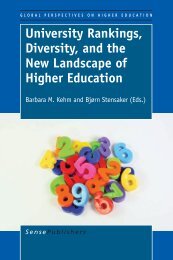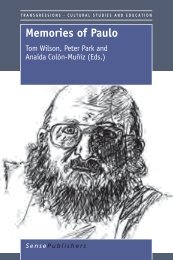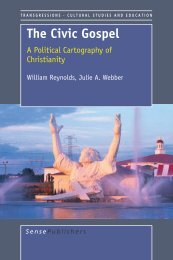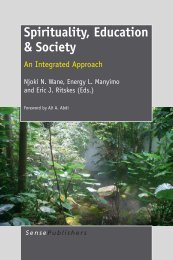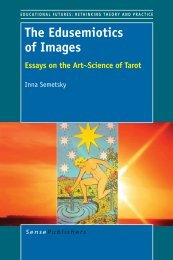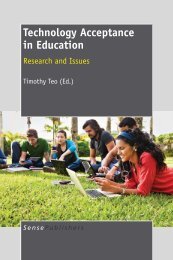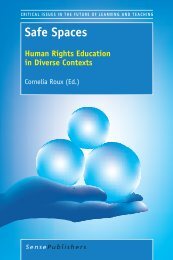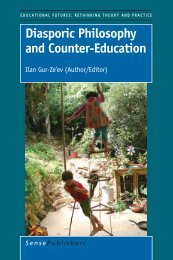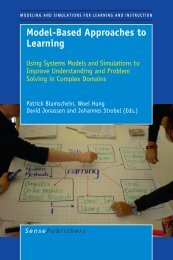Rupturing Concepts of Disability and Inclusion
Rupturing Concepts of Disability and Inclusion
Rupturing Concepts of Disability and Inclusion
Create successful ePaper yourself
Turn your PDF publications into a flip-book with our unique Google optimized e-Paper software.
CHAPTER 1<br />
communities <strong>and</strong> their culture because <strong>of</strong> a dominating white-skinned colonial<br />
ideology <strong>of</strong> Eurocentric superiority: an ideology promoted <strong>and</strong> enacted by both<br />
church <strong>and</strong> state. As a nation, Australians are now asked to feel the pains <strong>of</strong> the<br />
wounds inflicted on Indigenous people; to collectively be committed to tending<br />
the wounds towards repair; <strong>and</strong> to be honest enough to live with the presence <strong>of</strong><br />
the ongoing <strong>and</strong> ever-present scarring. This process <strong>of</strong> recognition has not been<br />
straight-forward, however, for the nation has been asked to respond to an articulated<br />
immorality <strong>of</strong> actions <strong>of</strong> the past, <strong>and</strong> contemporary responses vary as to what<br />
responsibilities should be taken for apologies.<br />
Theological, philosophical <strong>and</strong> social discourses, over time, separately <strong>and</strong> intersectionally,<br />
have served to create conditions for the exclusion <strong>of</strong> many different<br />
types <strong>of</strong> people from their birth origins <strong>and</strong> their communities. This exclusion has<br />
consistently <strong>and</strong> complexly been underpinned by moralities <strong>of</strong> goodness, rightness<br />
<strong>and</strong> the provision <strong>of</strong> ‘care’. Therefore, different practices such as the removal <strong>of</strong><br />
children for institutional care <strong>and</strong> or assimilation within white families, were<br />
founded on principles <strong>of</strong> utility, duty <strong>and</strong> virtue, which were enacted for a predetermined<br />
notion <strong>of</strong> ‘good’ for the inferior individuals, their families <strong>of</strong> origin,<br />
<strong>and</strong> the wider society. Practices such as these were hegemonically legitimated to<br />
affect marginalised people with pre-defined <strong>and</strong> prescriptive notions <strong>of</strong> well-being<br />
- excluding <strong>and</strong> including actions being the very tenets <strong>of</strong> such intentionality. The<br />
Selvedges <strong>of</strong> Definition metaphorically controlled the process <strong>of</strong> recognition <strong>and</strong><br />
entitlement to the ‘good’ implicit in these practices.<br />
In Western society, founded on the values <strong>and</strong> structures <strong>of</strong> such beliefs as<br />
Christianity, most <strong>of</strong>ten these exclusions have affected embodied persons who<br />
differ from white, well-educated, able-bodied males. In contemporary times, there<br />
are intentional processes in place to promote access <strong>and</strong> inclusion for such groups<br />
<strong>of</strong> excluded people into the public arenas at the centre <strong>of</strong> societies. However, the<br />
ethics, underpinned by goodness, rightness <strong>and</strong>/or virtuous acts, which historically<br />
founded, practised, <strong>and</strong> promoted exclusion have received little public scrutiny.<br />
James Rachels describes a common underst<strong>and</strong>ing <strong>of</strong> ethics, when he states,<br />
“Ethics is the subject that attempts to provide directions for conduct.” 27 Paul<br />
Komesar<strong>of</strong>f critically exp<strong>and</strong>s this underst<strong>and</strong>ing when he states:<br />
The task <strong>of</strong> ethics is no longer to define the nature <strong>of</strong> the good, or duty, or<br />
“the ends <strong>of</strong> man (sic)”, much less to derive irrefragable principles <strong>of</strong> correct<br />
action. Rather it is to uncover the nature <strong>of</strong> ethical values <strong>and</strong> the process <strong>of</strong><br />
value creation; it is to examine existing concepts <strong>and</strong> to expose their hidden<br />
assumptions; <strong>and</strong> it is to challenge the hegemony <strong>of</strong> existing value systems<br />
<strong>and</strong> so to exp<strong>and</strong> the possibilities for ethical action. 28<br />
Roslyn Diprose adds a spatial element when she declares:<br />
Even if we grant that ethics is about moral principles <strong>and</strong> moral judgement, it<br />
is also about location, position <strong>and</strong> place. It is about being positioned by, <strong>and</strong><br />
taking a position in relation to, others. Being positioned <strong>and</strong> locating others<br />
requires embodiment <strong>and</strong> some assumption about the nature <strong>of</strong> the place from<br />
which one moves towards others. It should not be surprising then that ‘ethics’<br />
is derived from the Greek word ethos, meaning character <strong>and</strong> dwelling, or<br />
6





